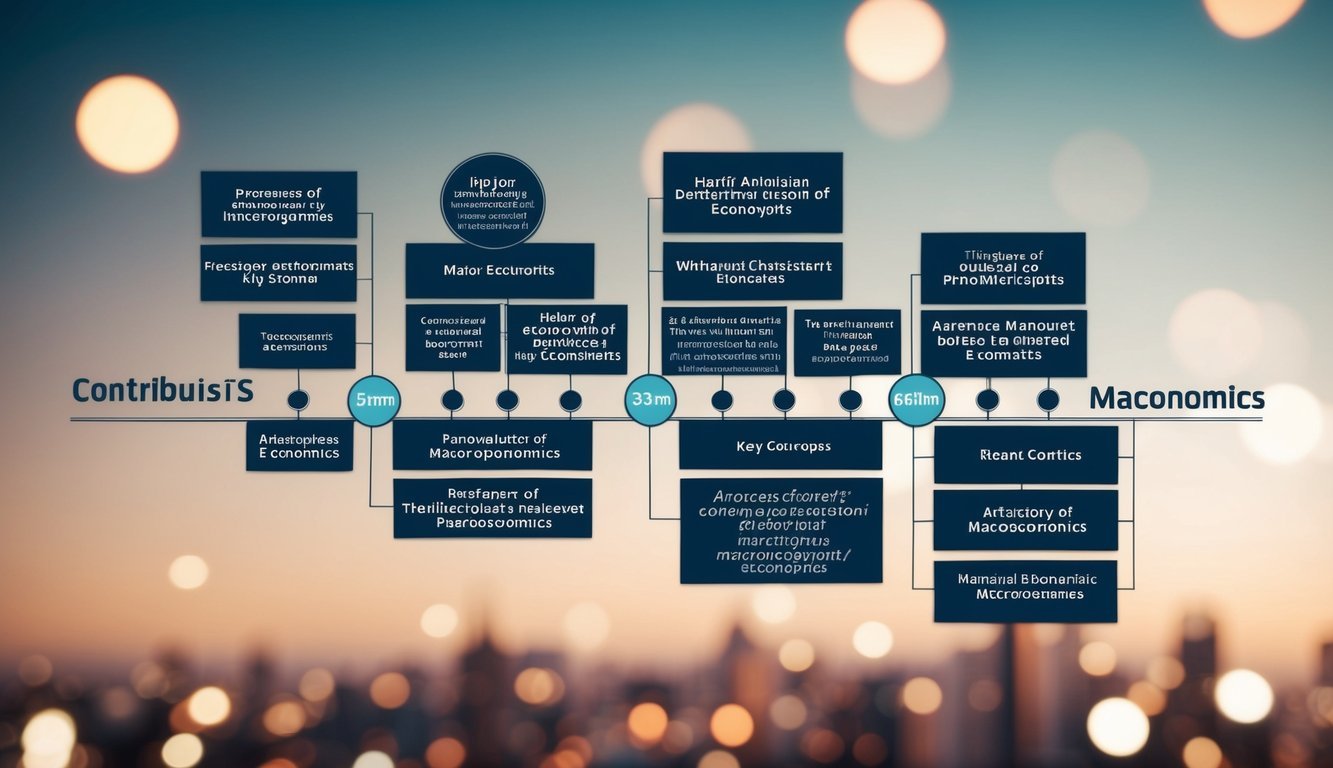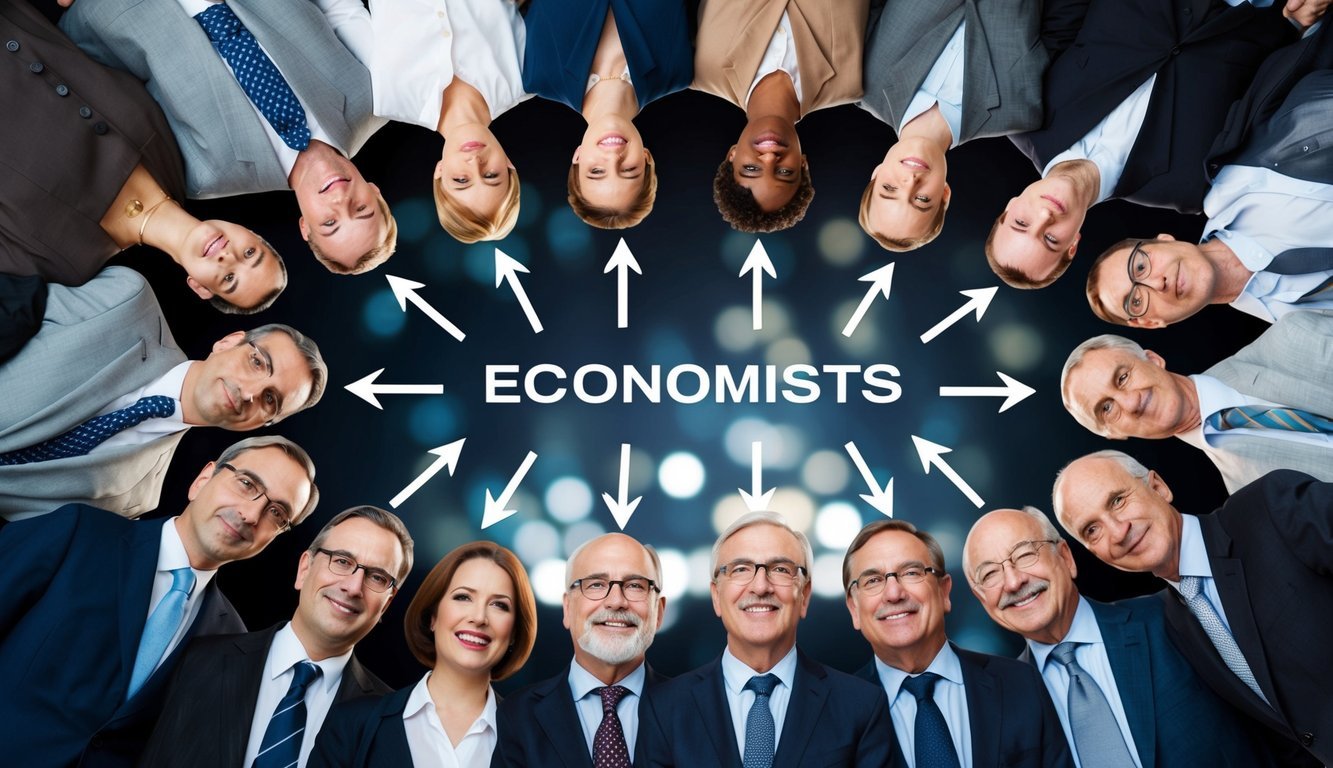Economics shapes our world in profound ways, influencing everything from government policies to individual financial decisions.
Understanding the major economists and their contributions provides valuable insights into how economic theories have evolved and continue to impact society. These influential thinkers have developed frameworks that explain market behavior, economic growth, and the distribution of wealth.

Their ideas have sparked debates, informed policy decisions, and shaped the course of history.
From Adam Smith’s invisible hand to John Maynard Keynes’ theories on government intervention, each economist has left an indelible mark on the field.
Modern economics continues to build upon these foundations, adapting to new challenges and incorporating insights from other disciplines.
Exploring the lives and ideas of major economists offers a fascinating journey through the development of economic thought.
It reveals how different philosophies have emerged in response to changing social and economic conditions, and how these theories continue to be refined and applied in today’s complex global economy.
Key Takeaways
- Economic theories shape policies and influence everyday financial decisions
- Major economists have developed diverse frameworks to explain market behavior and wealth distribution
- Modern economics continues to evolve, adapting to new challenges and incorporating interdisciplinary insights
The Foundation of Economic Theories

The development of economic thought has been shaped by key thinkers who laid the groundwork for modern economic understanding.
These pioneers introduced concepts that continue to influence economic analysis and policy today.
Adam Smith and Classical Economics
Adam Smith, often called the father of economics, revolutionized economic thinking with his seminal work “The Wealth of Nations“.
Published in 1776, this book introduced the concept of the invisible hand, which describes how self-interest in a free market economy leads to economic prosperity.
Smith argued that the division of labor and specialization were crucial for economic growth.
He believed that free markets, with minimal government intervention, would naturally regulate themselves through supply and demand mechanisms.
His ideas formed the foundation of classical economics, emphasizing the importance of free trade and market competition.
Smith’s work continues to influence economic policy and theory to this day.
David Ricardo and the Theory of Comparative Advantage
David Ricardo built upon Smith’s ideas and developed the theory of comparative advantage.
This concept explains why countries benefit from international trade even when one country is more efficient at producing all goods.
Ricardo’s theory suggests that nations should specialize in producing goods where they have a relative advantage and trade for other goods.
This principle underpins modern trade economics and supports arguments for free trade policies.
His work on rent, wages, and profits also contributed significantly to classical economic theory.
Ricardo’s ideas helped shape understanding of how different economic factors interact in markets.
Karl Marx and the Critique of Capitalism
Karl Marx presented a radical critique of capitalism in his works, most notably “Das Kapital”.
He argued that capitalism inherently leads to the exploitation of workers by those who own the means of production.
Marx introduced concepts like surplus value and the labor theory of value.
He predicted that capitalism would eventually collapse due to its internal contradictions, leading to a socialist revolution.
While his predictions have not fully materialized, Marx’s analysis of class struggle and economic inequality continues to influence social and economic thought.
His work has inspired various economic and political movements throughout history.
The Evolution of Macroeconomics

Macroeconomics emerged as a distinct field in response to major economic crises, shaping how we understand large-scale economic phenomena.
Key economists developed influential theories to explain and address economic challenges.
John Maynard Keynes and Keynesian Economics
John Maynard Keynes revolutionized economic thinking in the wake of the Great Depression.
His seminal work, published in 1936, introduced the concept of aggregate demand as a key driver of economic activity.
Keynes argued that during economic downturns, government intervention was necessary to stimulate demand and reduce unemployment.
He proposed increased public spending and lower interest rates as effective tools to combat recessions.
Keynesian economics dominated policy-making for decades, influencing governments to take an active role in managing economic cycles.
This approach aimed to smooth out fluctuations and maintain stable growth.
Milton Friedman and Monetarism
Milton Friedman challenged Keynesian dominance in the 1960s and 1970s with his monetarist theory.
He emphasized the importance of money supply in determining economic outcomes.
Friedman argued that inflation was primarily a monetary phenomenon.
He advocated for controlled, steady growth of the money supply to achieve price stability and sustainable economic growth.
Monetarism gained prominence during periods of high inflation, influencing central banks to focus on controlling the money supply.
This shift led to a greater emphasis on monetary policy as a tool for managing the economy.
Friedrich Hayek and the Austrian School
Friedrich Hayek, a leading figure in the Austrian School of economics, offered a distinct perspective on macroeconomic issues.
He emphasized the role of prices and market processes in coordinating economic activity.
Hayek argued against excessive government intervention, warning that it could distort market signals and lead to unintended consequences.
He stressed the importance of individual decision-making and spontaneous order in the economy.
The Austrian School’s ideas have influenced debates on economic policy, particularly regarding the limits of government planning and the benefits of free markets.
Their perspective offers a critical counterpoint to more interventionist approaches.
Alternative Approaches and Contemporary Advances

Economics has evolved beyond traditional models, embracing new perspectives that challenge conventional wisdom.
These approaches provide fresh insights into human behavior, strategic interactions, and institutional frameworks.
Behavioral Economics and Its Pioneers
Behavioral economics integrates psychological insights into economic analysis.
This field challenges the assumption of rational decision-making in traditional economic theory.
Key pioneers include Daniel Kahneman and Amos Tversky, who developed prospect theory.
Their work explores how people make decisions under uncertainty, often deviating from rational choice models.
Richard Thaler’s contributions to nudge theory have significant policy implications.
This approach suggests small changes in choice architecture can influence behavior without restricting freedom.
Behavioral economics also examines concepts like:
- Loss aversion
- Mental accounting
- Present bias
These ideas have reshaped our understanding of consumer behavior and financial decision-making.
Game Theory and Strategic Decision Making
Game theory analyzes strategic interactions between rational decision-makers.
It has applications in economics, politics, and business strategy.
Key concepts include:
- Nash equilibrium
- Prisoner’s dilemma
- Repeated games
John von Neumann and Oskar Morgenstern laid the foundations of game theory in their seminal work.
John Nash later expanded on these ideas, developing the concept of Nash equilibrium.
Game theory has practical applications in areas such as:
- Auctions
- Negotiation strategies
- Market competition analysis
It provides a framework for understanding complex social interactions and economic phenomena.
New Institutional Economics and Governance
New Institutional Economics (NIE) focuses on the role of institutions in shaping economic behavior and outcomes.
It examines how rules, norms, and governance structures influence economic performance.
Ronald Coase’s work on transaction costs laid the groundwork for NIE.
Oliver Williamson further developed these ideas, exploring organizational structures and contractual relationships.
Douglass North’s research on institutional change and economic history has been influential.
He emphasized the importance of property rights and legal systems in economic development.
NIE addresses topics such as:
- Property rights
- Transaction costs
- Principal-agent problems
This approach has implications for understanding economic development, organizational structures, and policy design.
Influential Economists and Their Philosophies

Economic thought has been shaped by several key figures who developed groundbreaking theories and approaches.
These economists’ philosophies have profoundly influenced policy, markets, and our understanding of economic systems.
Alfred Marshall and the Marginalist Revolution
Alfred Marshall played a crucial role in the Marginalist Revolution of the late 19th century.
He synthesized classical economics with new ideas about marginal utility and costs.
Marshall’s work focused on supply and demand, introducing concepts like elasticity and consumer surplus.
His book “Principles of Economics” became a standard text, emphasizing partial equilibrium analysis.
Marshall explored how prices, wages, and rents are determined in markets.
He also developed the concept of external economies, laying groundwork for later studies in industrial organization.
Marshall’s approach to economics was mathematical yet practical.
He stressed the importance of time in economic analysis, distinguishing between short and long-run effects.
Paul Krugman and the New Trade Theory
Paul Krugman revolutionized thinking about international trade with his New Trade Theory.
This work earned him the Nobel Memorial Prize in Economic Sciences in 2008.
Krugman challenged traditional models by explaining patterns of trade between similar countries.
He introduced concepts like economies of scale and consumer preference for variety.
These ideas helped explain why countries might both import and export the same types of goods.
Krugman’s models showed how industries could become concentrated in specific regions.
His work has implications for economic geography and urban economics.
Krugman also made significant contributions to currency crisis theory and economic policy debates.
John Kenneth Galbraith and Institutional Economics
John Kenneth Galbraith was a prominent figure in institutional economics.
He criticized mainstream economic theories for neglecting real-world complexities.
Galbraith’s work focused on the power dynamics within modern economies.
He coined terms like “conventional wisdom” and “countervailing power”.
Galbraith argued that large corporations had significant influence over markets and consumer behavior.
His book “The Affluent Society” challenged the focus on GDP growth as a measure of societal well-being.
Galbraith served as an advisor to several U.S. presidents.
He advocated for government intervention to address social issues and economic inequalities.
His accessible writing style helped bring economic ideas to a wider public audience.
The Impact of Economics on Society
Economics profoundly shapes societal structures, policies, and individual lives.
Its influence extends to welfare, environmental management, and global interconnectedness.
Economic Policy and Social Welfare
Welfare economics examines how economic policies affect social well-being.
Governments use taxation and public spending to redistribute wealth and provide essential services.
These interventions aim to balance efficiency with equity.
Liberal and laissez-faire approaches advocate for minimal government interference, believing free markets optimize resource allocation.
Critics argue this can exacerbate inequality.
Economic theories inform policy decisions on healthcare, education, and social security.
Policymakers must weigh trade-offs between economic growth and social protection.
The Role of Economics in Environmental Issues
Environmental economics addresses the complex relationship between economic activities and ecological systems.
It seeks to value natural resources and ecosystem services often overlooked by traditional markets.
Economists propose tools like carbon pricing to internalize environmental costs.
These mechanisms aim to incentivize sustainable practices and technological innovation.
The field also explores the economic impacts of climate change and biodiversity loss.
It informs policies on conservation, renewable energy, and sustainable development.
Economics and Globalization
International economics studies the interconnectedness of national economies.
Globalization has transformed the flow of goods, services, capital, and labor across borders.
Trade theories explain patterns of international exchange and specialization.
They inform debates on free trade agreements and protectionist policies.
Economic integration has spurred growth in many developing countries.
However, it has also raised concerns about labor standards, cultural homogenization, and economic volatility.
Economists analyze global financial systems and their impact on national economies.
This includes studying exchange rates, capital flows, and international monetary policies.
Further Reading and Resources
For those seeking to deepen their understanding of economic thought, numerous resources are available.
These range from comprehensive works by influential economists to modern contributions and essential economic terminology.
Comprehensive Works of Major Economists
Adam Smith’s The Theory of Moral Sentiments provides foundational insights into economic philosophy.
This seminal work explores moral and ethical considerations in economic decision-making.
For a broad overview, Steven Pressman’s Fifty Major Economists offers concise biographies and key ideas of influential thinkers.
It covers classical economists like David Ricardo and contemporary figures such as Paul Krugman.
Other essential readings include:
- John Maynard Keynes’ “The General Theory of Employment, Interest, and Money”
- Milton Friedman’s “Capitalism and Freedom”
- Karl Marx’s “Das Kapital”
These texts provide crucial context for understanding the evolution of economic thought.
Modern Contributions and Living Economists
Contemporary economists continue to shape the field with groundbreaking research and policy recommendations.
Notable figures include:
- Joseph Stiglitz: Nobel laureate known for his work on information asymmetry
- Esther Duflo: Pioneer in development economics and randomized controlled trials
- Thomas Piketty: Author of “Capital in the Twenty-First Century”
Their work addresses pressing issues such as inequality, climate change, and technological disruption.
Journals like the American Economic Review and the Quarterly Journal of Economics publish cutting-edge research by living economists.
The book “Women in the Age of Economic Transformation” highlights contributions of female economists to the field.
It explores gender-specific economic challenges and policy solutions.
A Glossary of Economic Terms and Concepts
Understanding key terminology is crucial for engaging with economic literature.
Essential concepts include:
- Opportunity Cost: The value of the next-best alternative forgone
- Elasticity: Measure of responsiveness of demand or supply to changes in price or income
- Externalities: Costs or benefits affecting third parties not involved in a transaction
Online resources like Investopedia and the Economics Network provide comprehensive glossaries.
These tools help readers navigate complex economic texts and discussions.
For visual learners, Khan Academy offers video explanations of fundamental economic principles.
These resources complement traditional textbooks and academic papers.

